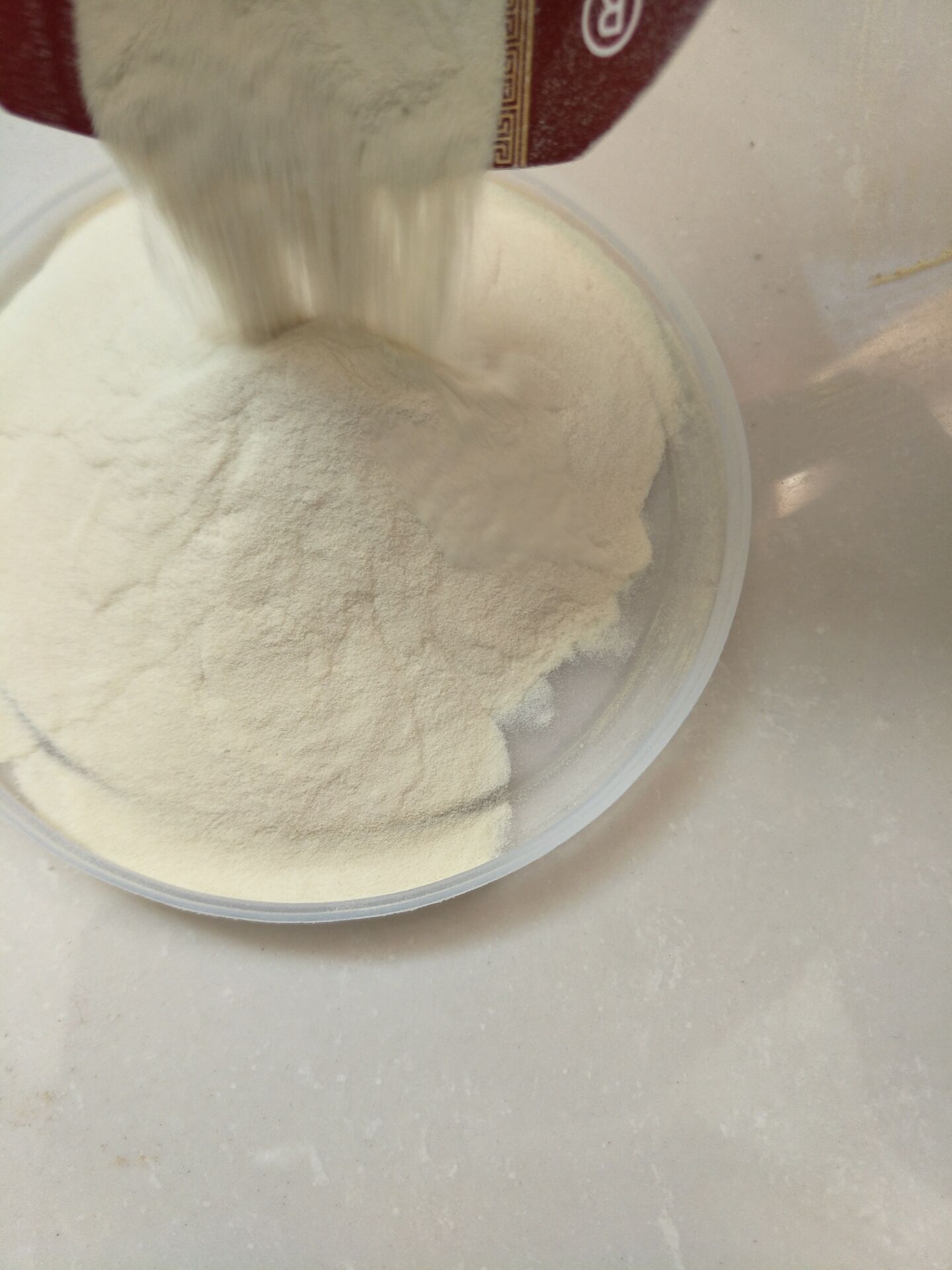Sinoright Blog
The Characteristics and Applications of Xanthan Gum
Xanthan Gum is a complex polysaccharide produced by the fermentation of wild rapeseed yellow fungus, usually made from corn starch. Xanthan gum is a white or light yellow powder with excellent thickening, suspension, emulsification, and water solubility, as well as good thermal, acid-base stability. It is commonly used as a thickener and emulsion stabilizer in food processing.

Xanthan gum is easily soluble in cold and hot water, neutral in solution, and resistant to freezing and thawing. Xanthan gum disperses and emulsifies in water to form a stable hydrophilic viscous colloid.
Xanthan gum can be used in beverages, bread, dairy products, meat products, jam, jelly, noodles, pastries, biscuits, shortening, instant coffee, fish products, ice cream, popsicles, and ice cream.
Xanthan gum is a thickener, emulsifier, and forming agent in the food industry, with a wide range of uses.

The application of xanthan gum
(1) Xanthan gum used in baked goods (bread, cake, etc.) can improve the water retention and softness of baked goods during baking and storage, thereby improving the taste of baked goods and extending their shelf life;
(2) Xanthan gum plays a role in tenderizing and improving water holding capacity in meat products;
(3) It has the function of thickening and stabilizing the structure of frozen food;
(4) Adding xanthan gum to jam can improve taste and water retention, and enhance product quality;
(5) Used in beverages, it can thicken and suspend, making the taste smooth and the flavor natural;
(6) The use of xanthan gum (in combination with guar gum and sophora bean gum) in ice cream and dairy products can stabilize the products;
(7) Xanthan gum, carrageenan, sophora bean gum, and other compounds are also commonly used in jelly and candy processing.
(2) Xanthan gum plays a role in tenderizing and improving water holding capacity in meat products;
(3) It has the function of thickening and stabilizing the structure of frozen food;
(4) Adding xanthan gum to jam can improve taste and water retention, and enhance product quality;
(5) Used in beverages, it can thicken and suspend, making the taste smooth and the flavor natural;
(6) The use of xanthan gum (in combination with guar gum and sophora bean gum) in ice cream and dairy products can stabilize the products;
(7) Xanthan gum, carrageenan, sophora bean gum, and other compounds are also commonly used in jelly and candy processing.
The characteristics and properties of xanthan gum
Suspension and emulsification properties
Xanthan gum has a good suspension effect on insoluble solids and oil droplets. The molecules of xanthan gum sol can form super bound helical copolymers, forming a fragile gel like network structure, which can support the morphology of solid particles, droplets, and bubbles, demonstrating strong emulsification stability and high suspension ability.
Water solubility
Xanthan gum can dissolve quickly in water and has good water solubility. Especially soluble in cold water, it eliminates the need for complicated processing and is convenient to use. However, due to its strong hydrophilicity, if water is added directly and stirred insufficiently, the outer layer will absorb water and expand into micelles, which will prevent water from entering the inner layer and affect its effectiveness. Therefore, it is necessary to pay attention to correct use. Mix xanthan gum dry powder or dry powder additives such as salt and sugar, then slowly add the stirring water to make a solution for use.
Thickening properties
Xanthan gum solution has the characteristic of low concentration and high viscosity (the viscosity of a 1% aqueous solution is 100 times that of gelatin), making it an efficient thickener.
Pseudo plasticity
Xanthan gum aqueous solution exhibits high viscosity under static or low shear conditions, and exhibits a sharp decrease in viscosity under high shear conditions, while the molecular structure remains unchanged. When the shear force is eliminated, the original viscosity is immediately restored. The relationship between shear force and viscosity is completely plastic. Xanthan gum exhibits outstanding pseudoplasticity, which is highly effective in stabilizing suspensions and emulsions.
Stability to heat
The viscosity of xanthan gum solution does not change significantly with temperature changes. Generally, polysaccharides undergo viscosity changes due to heating, but the viscosity of xanthan gum aqueous solution remains almost unchanged between 10-80 ℃. Even low concentration aqueous solutions exhibit stable high viscosity over a wide temperature range. 1% xanthan gum solution (containing 1% potassium chloride) is heated from 25 ℃ to 120 ℃. Its viscosity only decreases by 3%.
Stability of acidity and alkalinity
Xanthan gum solution is very stable to acidity and alkalinity, and its viscosity is not affected between pH 5-10. There is a slight change in viscosity when pH is less than 4 and greater than 11. Within the range of PH3-11, the difference between the viscosity ambassador and the small value is less than 10%. Xanthan gum can dissolve in various acid solutions, such as 5% sulfuric acid, 5% nitric acid, 5% acetic acid, 10% hydrochloric acid, and 25% phosphoric acid. These xanthan gum acid solutions are quite stable at room temperature and the quality of the product remains unchanged for several months. Xanthan gum can also dissolve in sodium hydroxide solution and has thickening properties. The resulting solution is very stable at room temperature. Xanthan gum can be degraded by strong oxidants such as perchloric acid and persulfuric acid, and the degradation accelerates with increasing temperature.
Stability of salt
Xanthan gum solution can be mixed with many salt solutions (potassium salts, sodium salts, calcium salts, magnesium salts, etc.), and its viscosity is not affected. Under high salt concentration conditions, even in saturated salt solutions, its solubility is maintained without precipitation and flocculation, and its viscosity is almost unaffected.
Stability of enzymatic hydrolysis reaction
The stable double helix structure of xanthan gum endows it with strong antioxidant and anti enzymatic abilities. Many enzymes such as proteases, amylases, cellulases, and hemicellulases cannot degrade xanthan gum.
Xanthan gum has a good suspension effect on insoluble solids and oil droplets. The molecules of xanthan gum sol can form super bound helical copolymers, forming a fragile gel like network structure, which can support the morphology of solid particles, droplets, and bubbles, demonstrating strong emulsification stability and high suspension ability.
Water solubility
Xanthan gum can dissolve quickly in water and has good water solubility. Especially soluble in cold water, it eliminates the need for complicated processing and is convenient to use. However, due to its strong hydrophilicity, if water is added directly and stirred insufficiently, the outer layer will absorb water and expand into micelles, which will prevent water from entering the inner layer and affect its effectiveness. Therefore, it is necessary to pay attention to correct use. Mix xanthan gum dry powder or dry powder additives such as salt and sugar, then slowly add the stirring water to make a solution for use.
Thickening properties
Xanthan gum solution has the characteristic of low concentration and high viscosity (the viscosity of a 1% aqueous solution is 100 times that of gelatin), making it an efficient thickener.
Pseudo plasticity
Xanthan gum aqueous solution exhibits high viscosity under static or low shear conditions, and exhibits a sharp decrease in viscosity under high shear conditions, while the molecular structure remains unchanged. When the shear force is eliminated, the original viscosity is immediately restored. The relationship between shear force and viscosity is completely plastic. Xanthan gum exhibits outstanding pseudoplasticity, which is highly effective in stabilizing suspensions and emulsions.
Stability to heat
The viscosity of xanthan gum solution does not change significantly with temperature changes. Generally, polysaccharides undergo viscosity changes due to heating, but the viscosity of xanthan gum aqueous solution remains almost unchanged between 10-80 ℃. Even low concentration aqueous solutions exhibit stable high viscosity over a wide temperature range. 1% xanthan gum solution (containing 1% potassium chloride) is heated from 25 ℃ to 120 ℃. Its viscosity only decreases by 3%.
Stability of acidity and alkalinity
Xanthan gum solution is very stable to acidity and alkalinity, and its viscosity is not affected between pH 5-10. There is a slight change in viscosity when pH is less than 4 and greater than 11. Within the range of PH3-11, the difference between the viscosity ambassador and the small value is less than 10%. Xanthan gum can dissolve in various acid solutions, such as 5% sulfuric acid, 5% nitric acid, 5% acetic acid, 10% hydrochloric acid, and 25% phosphoric acid. These xanthan gum acid solutions are quite stable at room temperature and the quality of the product remains unchanged for several months. Xanthan gum can also dissolve in sodium hydroxide solution and has thickening properties. The resulting solution is very stable at room temperature. Xanthan gum can be degraded by strong oxidants such as perchloric acid and persulfuric acid, and the degradation accelerates with increasing temperature.
Stability of salt
Xanthan gum solution can be mixed with many salt solutions (potassium salts, sodium salts, calcium salts, magnesium salts, etc.), and its viscosity is not affected. Under high salt concentration conditions, even in saturated salt solutions, its solubility is maintained without precipitation and flocculation, and its viscosity is almost unaffected.
Stability of enzymatic hydrolysis reaction
The stable double helix structure of xanthan gum endows it with strong antioxidant and anti enzymatic abilities. Many enzymes such as proteases, amylases, cellulases, and hemicellulases cannot degrade xanthan gum.
